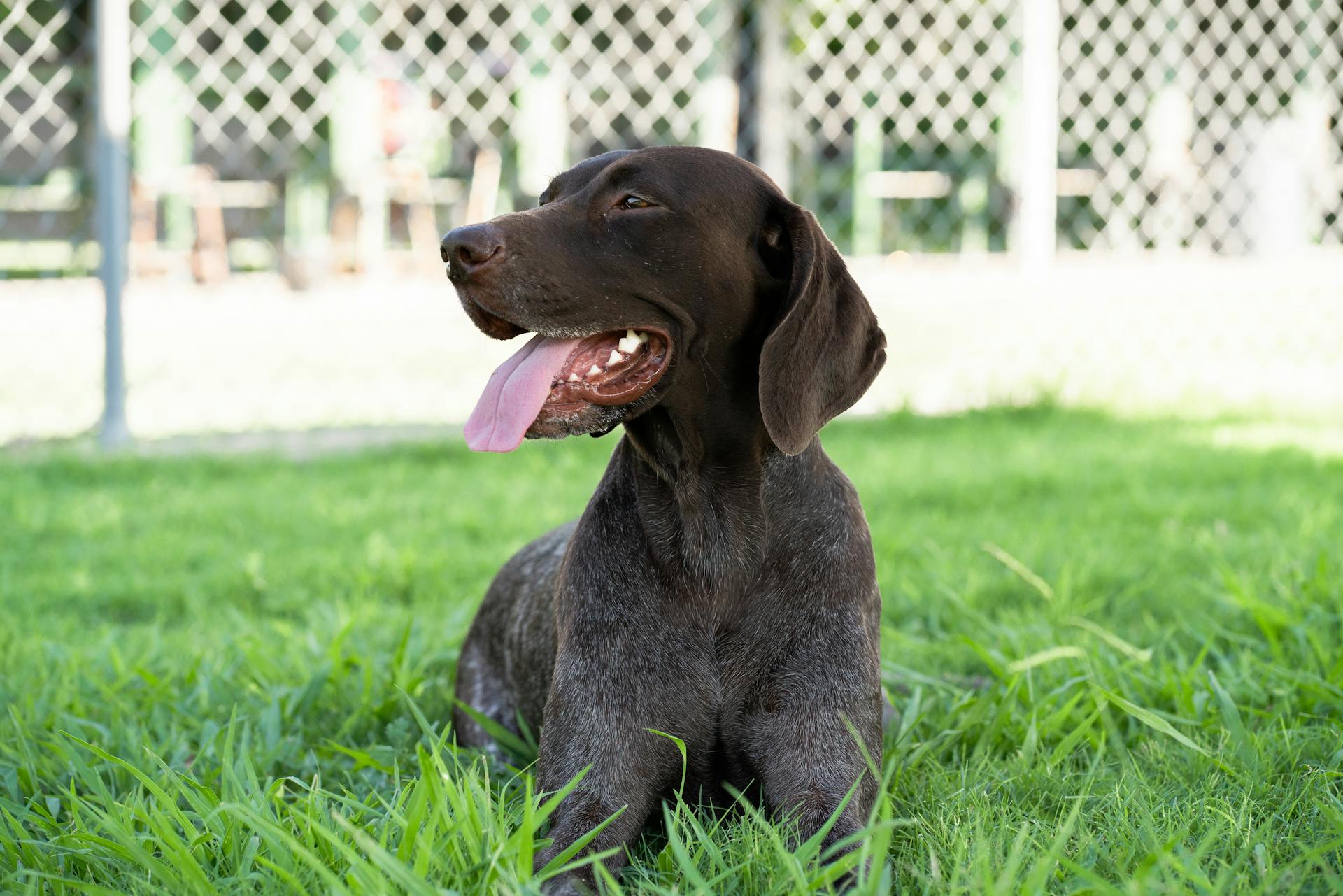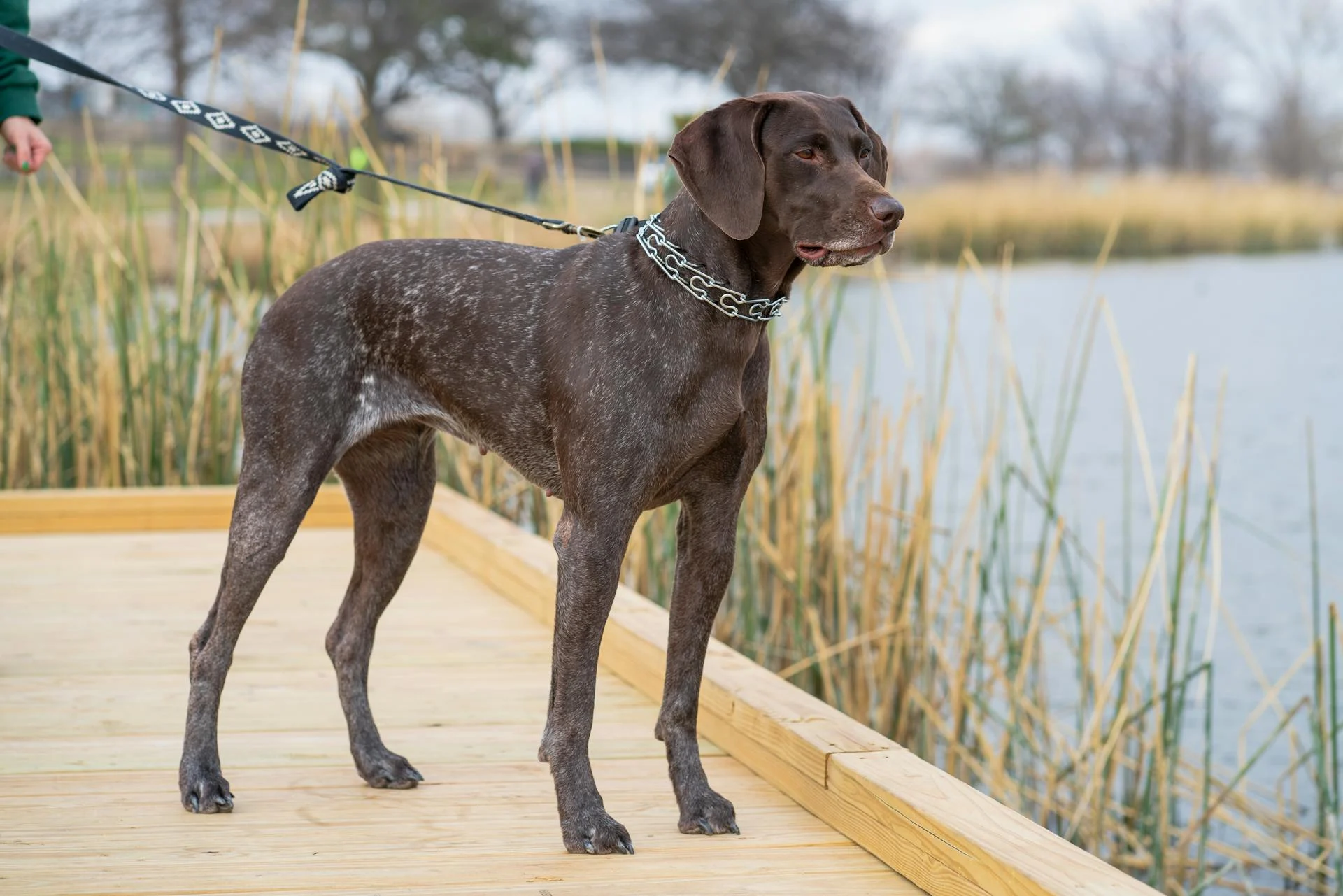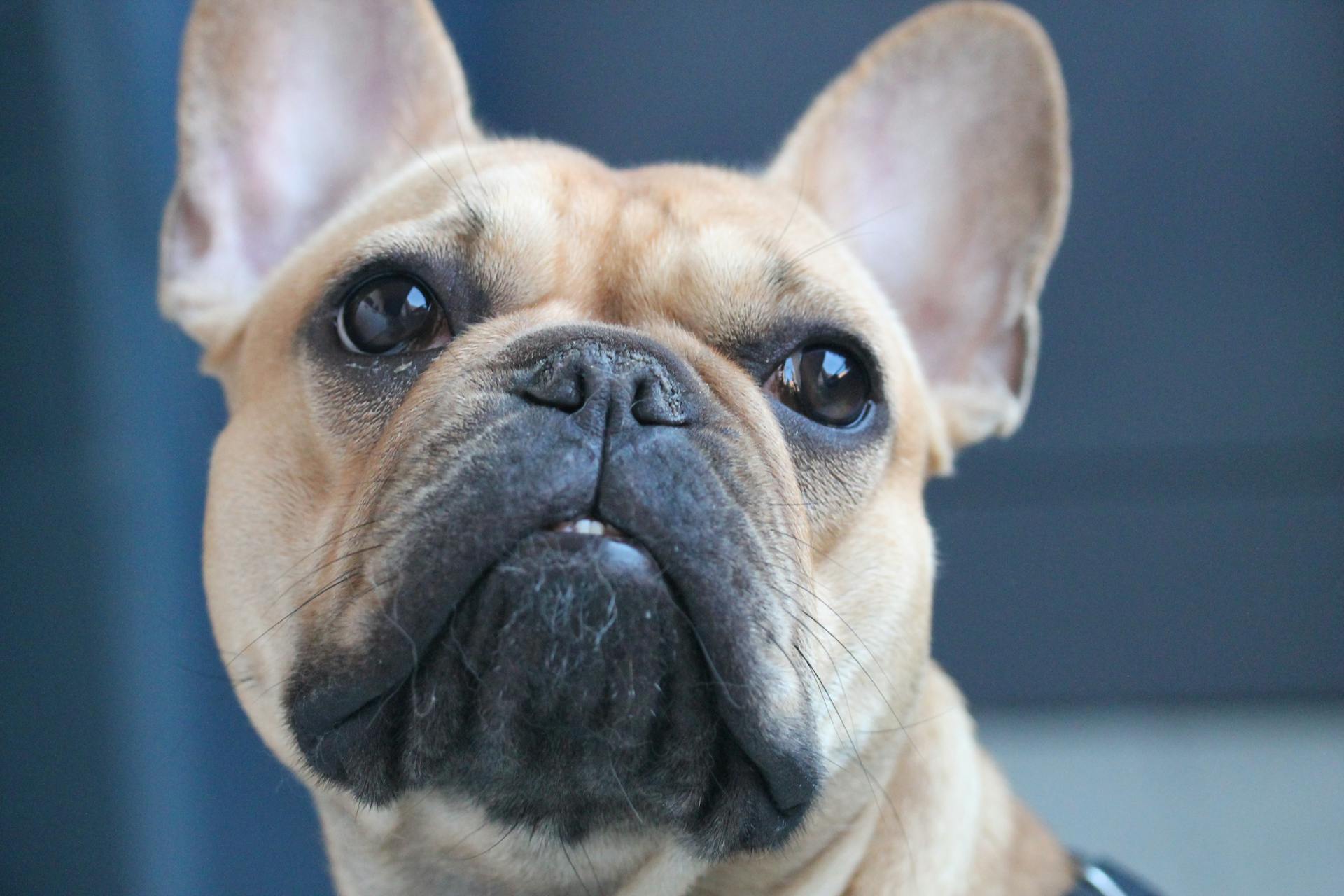
The German Shorthaired Pointer is a versatile breed that excels in both hunting and family life. They were originally bred in the 19th century for their ability to hunt a variety of game.
One of the main pros of owning a German Shorthaired Pointer is their high energy level, which makes them perfect for active families or individuals. They require regular exercise to stay happy and healthy.
Their intelligence and trainability also make them a great choice for first-time dog owners. With consistent training, they can learn to obey commands and behave well in public.
German Shorthaired Pointers are generally good with children, but as with any breed, it's essential to socialize them properly from an early age. They can be wary of strangers, but with proper introduction, they can learn to trust new people.
Explore further: Dogs Breeds That Start with B
Quick Facts
The German Shorthaired Pointer is a wonderful breed, and here are some quick facts to get you started:
They originated in Germany, which is no surprise given their name.
Their breed group is Sporting, which means they were bred for hunting and love to stay active.
Male German Shorthaired Pointers typically stand between 22-25 inches tall, while females stand between 21-23 inches.
Males weigh between 55-70 pounds, while females weigh between 45-60 pounds.
On average, German Shorthaired Pointers live for 12-14 years, which is a good amount of time to enjoy their company.
They're known for being friendly, intelligent, eager to please, and active, making them a great companion for outdoor enthusiasts.
Their grooming needs are moderate, which means they require regular brushing but don't need to be bathed too frequently.
To keep them happy and healthy, they need a lot of exercise, so be prepared to take them on long walks or runs.
Training a German Shorthaired Pointer can be relatively easy, but be warned: they can be stubborn at times.
Some common health issues to watch out for include hip dysplasia, elbow dysplasia, eye problems, and bloat.
You might be surprised to learn that German Shorthaired Pointers have been owned by famous folks like actor Bradley Cooper and country music stars Tim McGraw and Chase Bryant.
Intriguing read: Dog Breeds That Don't Need Grooming
What to Consider
If you're considering bringing a German Shorthaired Pointer into your home, it's essential to think about their exercise needs. They require regular physical activity to stay happy and healthy, so you'll need to be prepared to take them on long walks or runs.
Their high energy levels can be a challenge, especially for owners with busy schedules. Without enough exercise, they can become bored and develop destructive behaviors.
German Shorthaired Pointers are also natural hunters, which means they may chase small animals or birds if they get the chance. This can be problematic in certain environments or for households with other pets.
They're generally good with kids and other dogs, but they do have a strong hunting instinct. This can be beneficial if you're an avid hunter, but it may require some extra training and management if you're not.
Here are some of the types of game they're bred to hunt:
- Game birds, particularly waterfowl
- Possums
- Rabbits
- Raccoons
- Deer
Overall, German Shorthaired Pointers are intelligent and trainable, but they can also be stubborn at times. Consistent and patient training is key to helping them become well-behaved companions.
Exercise and Care
German Shorthaired Pointers are built for action, requiring at least an hour of exercise per day to stay happy and healthy. They thrive on physical activity, so plan for long walks, energetic games of fetch, and strenuous hikes.
Their hunting background makes them naturally independent, so training requires patience, kindness, and consistency. Use positive reinforcement methods like food rewards and praise to keep them engaged and motivated.
Grooming is a breeze for German Shorthaired Pointers, requiring only a few minutes of brushing every few days. However, they do shed, especially during hotter months, so regular baths can help reduce loose fur.
To prevent medical issues, keep their nails trimmed short and clean their ears regularly. With proper care, they'll be a joy to be around.
Here's a quick rundown of their exercise needs:
Remember, German Shorthaired Pointers are prone to bloat, so feed them smaller meals and avoid exercising immediately after eating. With the right care and attention, they'll be a loyal companion for years to come.
Coat Color and Grooming
The German Shorthaired Pointer's coat is a beautiful aspect of their breed. It's short and dense, providing excellent water resistance.
Their coat is relatively low maintenance and doesn't shed excessively. Regular brushing with a firm bristle brush once a week is sufficient to keep the coat in good condition.
A liver roan GSP has a rich reddish-brown coat accentuated by white hairs. This unique coat pattern is one of the many variations of their coat color.
Bathing should be done only when necessary, as over-bathing can strip their coat of its natural oils. To enhance the coat's shine, gently rub your GSP's fur with a towel or chamois.
By maintaining proper coat care and monitoring your GSP's overall hygiene, you can help keep your companion healthy and comfortable.
Personality and Temperament
The German Shorthaired Pointer is known for its intelligence, friendliness, and eagerness to please. They form strong bonds with their family, often having a special favorite member.
This breed approaches life with enthusiasm, displaying a confident and steady demeanor without being nervous or flighty. They thrive as house dogs, valuing close companionship over being kept in a yard or kennel.
German Shorthaired Pointers are highly trainable, receptive to learning, and enjoy the mental stimulation that training provides. They can develop separation anxiety if left alone, so regular interaction is essential.
Males tend to be more affectionate, friendly, and eager to please than females, often becoming more energetic and playful with age. They can be somewhat protective of their family or territory, but are not a breed prone to aggression.
Personality / Character
Male German Shorthaired Pointers are affectionate, friendly, and eager to please their owners. They're often called "perpetual puppies" because instead of slowing down, they become more energetic and playful as they get older.
Male German Shorthaired Pointers tend to be clingier than their female counterparts. This means they'll often form strong bonds with their family members.
German Shorthaired Pointers can have a tendency to be more aggressive than females, especially if they're left intact. However, they're not a breed prone to aggression.
They can be somewhat protective of their family or territory.
Hunting Ability by Sex

When training a German Shorthaired Pointer, it's essential to remember that both males and females have strong hunting instincts, making them fantastic hunting dogs.
In fact, there's no discernible difference between the hunting abilities of male and female German Shorthaired Pointers.
Their trainability and temperament, however, can vary, and this is where sex can play a role - it's more about personal preference.
If they're trained well and properly socialized from a young age, sex won't affect their skill as a hunting companion.
Ultimately, whether you choose a male or female German Shorthaired Pointer, you can expect a loyal and skilled hunting partner.
Health and Wellbeing
German Shorthaired Pointers are generally a healthy breed, but like all dogs, they can be prone to certain health conditions. Hip dysplasia, a condition where the hip joint doesn't develop properly, is one of them.
Hip dysplasia can range from mild cases that require proper diet and exercise to severe cases that may necessitate surgical intervention. Dogs with hip dysplasia should not be used for breeding.
Take a look at this: Bernese Mountain Dog Hip Dysplasia
Some common health issues in German Shorthaired Pointers include heart disease, eye conditions, and hip dysplasia. Heart disease can be caused by cardiomyopathy, and signs include difficulty breathing and fainting. Eye conditions include progressive retinal atrophy, where your dog may eventually go blind.
Here are some common health issues in German Shorthaired Pointers:
- Heart disease (cardiomyopathy)
- Eye conditions (progressive retinal atrophy, entropion, ectropion, cataracts, retinal dysplasia)
- Hip dysplasia
- Bloat (GDV)
- Blood clotting diseases (Von Willebrand’s disease, hemophilia, thrombocytopenia)
- Idiopathic epilepsy
Health
As a responsible dog owner, understanding the potential health issues that can affect your German Shorthaired Pointer (GSP) is crucial for their well-being.
GSPs are generally a healthy breed, but they can be prone to certain health conditions, including hip dysplasia, a condition where the hip joint doesn't develop properly.
Proper diet and exercise can help manage mild cases of hip dysplasia, but severe cases may require surgical intervention. Dogs with hip dysplasia should not be used for breeding.
Cancer is another health concern for GSPs, with a higher incidence of certain cancers such as mammary tumors, mast cell tumors, and lymphosarcoma.

Regular check-ups with your veterinarian can help detect any potential health issues early on, and responsible breeding practices can also help reduce the risk of inherited conditions.
GSPs are also susceptible to eye conditions, including entropion, where the eyelid rolls inward, and progressive retinal atrophy, which can lead to blindness.
Annual eye exams with your veterinarian can help detect any signs of deterioration, but unfortunately, there is no treatment for progressive retinal atrophy.
Bloat, also known as GDV, is a life-threatening condition that can occur in deep-chested breeds like GSPs, where the stomach fills with gas or air and twists.
Factors such as eating one large meal a day, eating rapidly, and exercising vigorously can contribute to GDV, and elevated feeding dishes and specific types of food may also play a role.
If you suspect your GSP has bloat, it's essential to seek immediate veterinary attention to prevent severe complications.
Here are some common health issues to watch for in GSPs:
- Heart disease, including cardiomyopathy, which can cause difficulty breathing, fainting, and a decreased desire to exercise.
- Eye conditions, including entropion, ectropion, cataracts, and retinal dysplasia.
- Hip dysplasia, a condition where the ball and socket of the hip joint do not fit or develop properly.
- Bloat, also known as GDV, which can cause an enlarged abdomen, retching, and drooling.
- Blood clotting diseases, including Von Willebrand’s disease, which can cause heavy bleeding.
- Idiopathic epilepsy, a condition that can cause seizures in dogs for unknown reasons.
Feeding
A German Shorthaired Pointer's daily food intake can vary greatly depending on their size, age, build, metabolism, and activity level. They require 2 to 3 cups of high-quality dry food, divided into two meals.
It's essential to choose a high-quality dog food that provides better nutrition, allowing you to feed smaller portions while meeting their nutritional requirements. This can help maintain your GSP in good shape.
To ensure you're not overfeeding your GSP, perform the eye test and hands-on test. If you can't see a waistline or feel their ribs without applying excessive pressure, it may be necessary to reduce their food intake and increase exercise.
Regularly checking your GSP's food intake and adjusting it according to their needs can help prevent obesity and related health issues.
A fresh viewpoint: Best Food for Rhodesian Ridgeback
[Training, Breeding]
Training a German Shorthaired Pointer requires early obedience training to prevent destruction and manage their energy. They are generally easy to train, but males can be harder to teach off-leash walking due to their strong instinct to follow their nose.
Males are more food-motivated than females, making training easier, but they also require more maintenance and have shorter attention spans, so training sessions should be shorter. Females, on the other hand, are less food-motivated and have longer attention spans, but may be harder to train.
Male German Shorthaired Pointers are more social and bond with all family members, not just their handler. They socialize well and are more likely to form close relationships with everyone in the household.
Here are some key differences in training and breeding between male and female German Shorthaired Pointers:
- Male: More food-motivated, harder to train off-leash, shorter attention span, requires more maintenance
- Female: Less food-motivated, easier to train off-leash, longer attention span, less maintenance required
Overall, German Shorthaired Pointers are a versatile breed that can thrive with proper training and socialization.
Frequently Asked Questions
Are German Shorthaired Pointers difficult?
German Shorthaired Pointers can be challenging during their adolescent phase (6 months to 3 years old), but they're also highly trainable and receptive to early obedience commands. With proper training and exercise, they can thrive and become wonderful companions.
Sources
Featured Images: pexels.com


